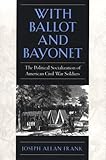
Joseph Allan Frank. With Ballot and Bayonet: the Political Socialization of American Civil War Soldiers. Athens: University of Georgia Press, 1998. xi + 304 pp. $40.00 (cloth), ISBN 978-0-8203-1975-9.
Reviewed by Nicole Etcheson (Department of History, University of Texas at El Paso)
Published on H-CivWar (December, 1998)
The Citizen-Soldier in the U.S. Civil War
The recent success of James M. McPherson's For Cause and Comrade indicates the continued interest in the motivations of Civil War soldiers. [1] While Gerald F. Linderman has proposed that volunteers' early enthusiasm for a romantic war waned, [2] McPherson finds the early idealism of the war continuing throughout its length. Earl J. Hess offered another rebuttal to Linderman by stressing the psychological strength of troops in combat. [3] In With Ballot and Bayonet, Joseph Allan Frank enters this much contested terrain.
Frank's answer to why they fought is simple. Politics. The "citizen-soldier" is at the heart of Frank's analysis. Just as the United States had achieved "mass participation in electoral politics" (p. 5) during the Jacksonian period, its Civil War armies would be "mass" armies, requiring the active consent and participation, rather than passive obedience, of the troops. Having borrowed so much from the soldiers' civilian politicization, the Civil War armies never made their troops into professionals. Even after several years of service, they would remain citizens as much as soldiers.
Frank begins by looking at Union and Confederate views that citizens owed military service to the state and the childhood political socialization that inculcated acceptance of those views among the population. Using three measures of "political awareness" ("political acuity," "breadth" of interest in politics, and "sense of political effectiveness"), Frank finds that twenty-five percent of soldiers were interested in politics. He estimates that about fifteen percent of his sample of slightly over one thousand soldiers "registered a high level of awareness" for all three indicators of politicization. He further asserts the importance of these "true believers" in motivating their comrades (pp. 33-39).
Politicized soldiers, Frank finds, expressed much interest in the strategic situation of their armies and the politics of their officers. As soldiers they reserved the same right to criticize their commanders, that as citizens they had had to criticize their elected leaders. In fact, they continued to exercise their rights as citizens during the war itself. Frank discusses in detail the Union soldier vote in the election of 1864. As "an army of thinking bayonets" (p. 117), soldiers considered the impact of battlefield success on foreign intervention and hopes for a negotiated peace. Politicized soldiers also proved intolerant of civilian dissent from the war.
In his discussion of the "hard war," Frank argues that the more politically motivated the soldier, the more likely he was to support a harsh war. Union troops wished to punish the "traitors." Confederate troops struck back at the radical restructuring of Southern race relations inherent in the Union war aims by massacring black troops.
Frank's work shows extensive and thoughtful research in primary sources. His frequent comparisons to other mass armies, particularly those of the French Revolution and English Civil War are apt and demonstrate the breadth of his thinking. Still the book leaves one with questions. How are we to know that the "true believers" had an impact on the motivations of other soldiers? If their fellow soldiers did not write about politics, what evidence is there that the true believers, or any other political source, influenced them? The internal chronology of the war deserves more attention. Frank writes that the overwhelming majority of Northern soldiers favored emancipation and the enlistment of black troops. But when did they express these opinions, before or after emancipation became a reality? How did politicization occur over time? Of his sample, how many began the war indifferent to its larger political issues and became politically aware because of their involvement in combat?
Nonetheless, Frank is surely right to remind us of the importance of politics to the fighting of the Civil War. Whether the soldier fought for love of Union or Confederacy, or simply home and country, he made an inherently political choice.
NOTES
[1.] James M. McPherson, For Cause and Comrade: Why Men Fought in the Civil War (New York: Oxford University Press, 1997).
[2.] Gerald F. Linderman, Embattled Courage: The Experience of Combat in the American Civil War (New York: Free Press, 1987).
[3.] Earl J. Hess, The Union Soldier in Battle: Enduring the Ordeal of Combat (Lawrence: University Press of Kansas, 1997).
Copyright (c) 1998 by H-Net, all rights reserved. This work may be copied for non-profit educational use if proper credit is given to the author and the list. For other permission, please contact H-Net@h-net.msu.edu.
If there is additional discussion of this review, you may access it through the network, at: https://networks.h-net.org/h-civwar.
Citation:
Nicole Etcheson. Review of Frank, Joseph Allan, With Ballot and Bayonet: the Political Socialization of American Civil War Soldiers.
H-CivWar, H-Net Reviews.
December, 1998.
URL: http://www.h-net.org/reviews/showrev.php?id=2562
Copyright © 1998 by H-Net, all rights reserved. H-Net permits the redistribution and reprinting of this work for nonprofit, educational purposes, with full and accurate attribution to the author, web location, date of publication, originating list, and H-Net: Humanities & Social Sciences Online. For any other proposed use, contact the Reviews editorial staff at hbooks@mail.h-net.org.



